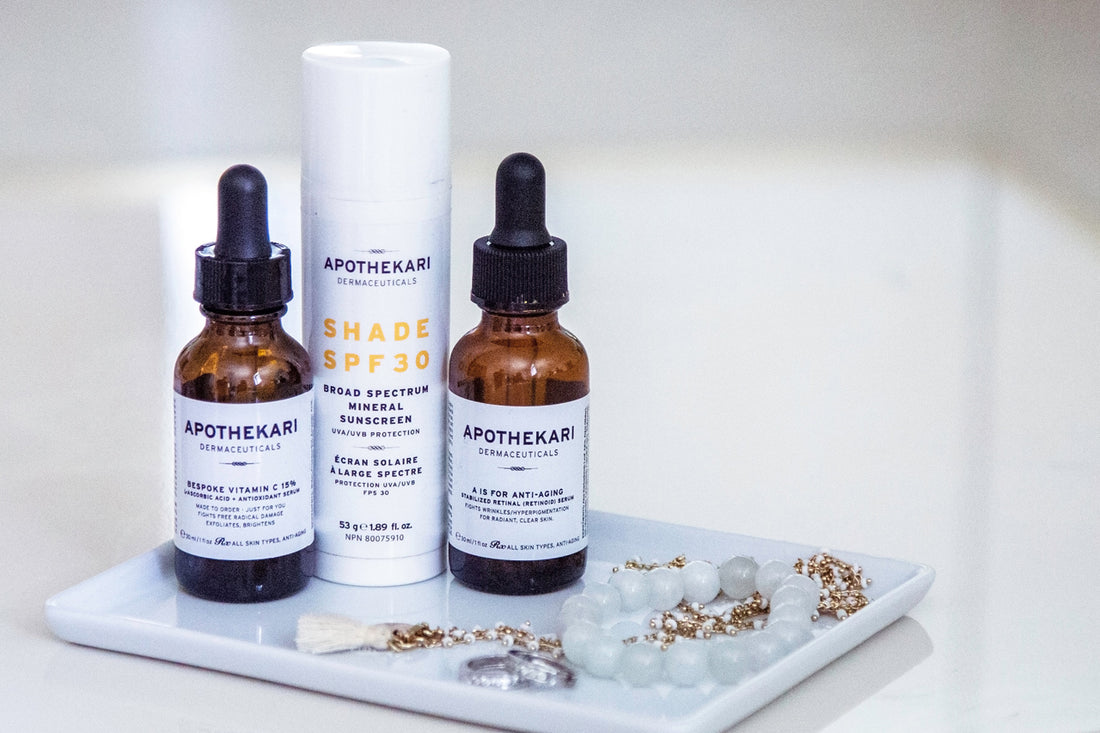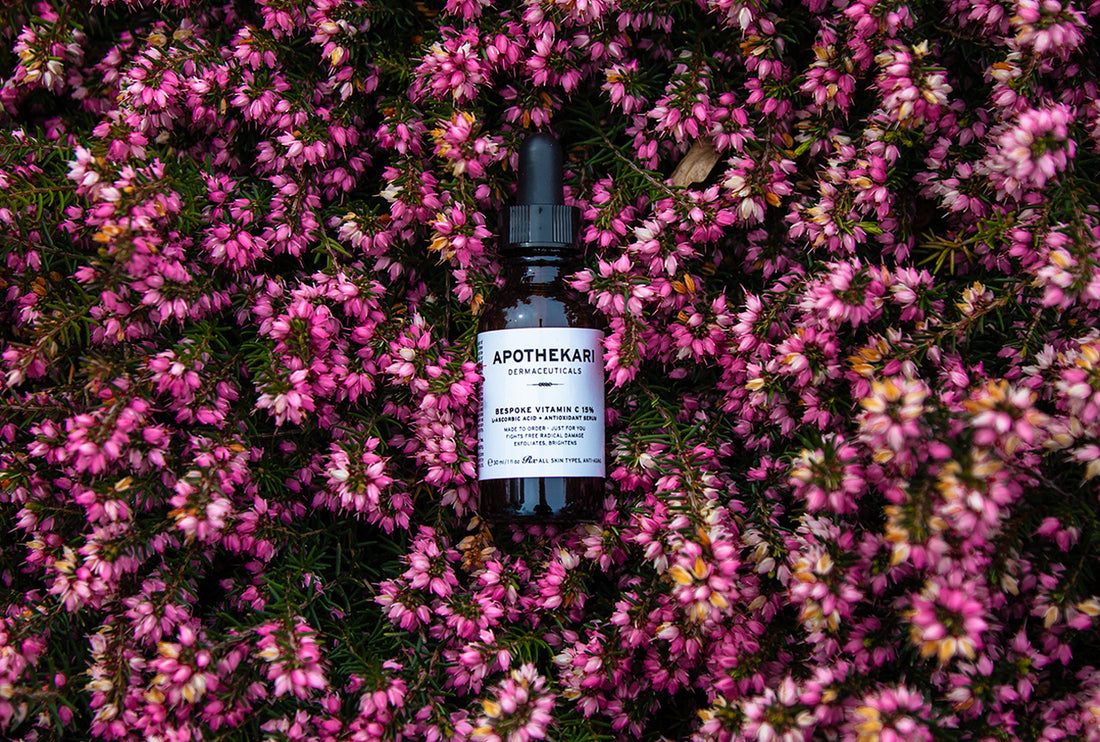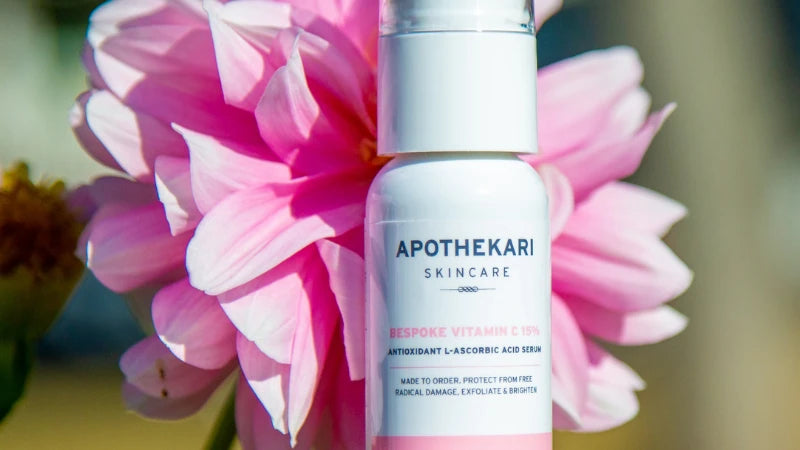Blog
9 Vitamin C Myths You Must Stop Believing
Although it’s a superstar skin care ingredient, there are many vitamin C myths circulating around when it comes to skin care. We’ve written about its benefits before, and in this post, we’re debunking the 9 most common vitamin C myths and setting the record straight. Shop Bespoke Vitamin C 15% Shop Bespoke Vitamin C 10% 1. All vitamin C is the same While the front of your bottle may read as just simply containing vitamin C, in the ingredient list, it can show up as L-ascorbic Acid (pure vitamin C) or other forms including ascorbyl glucoside, magnesium ascorbyl phosphate, ascorbyl tetraisopalmitate, etc. While they are all called vitamin C, they differ in the results they deliver. Plus, each type may be tolerated differently when it comes to your skin. So what type of vitamin C is best? We’re big fans of L-ascorbic acid, because it’s backed by the most amount of research when it comes to its benefits for skin–boosting collagen production; inhibiting melanin synthesis, which contributes to age spots; exfoliating for more glowing skin, etc. It’s what’s in our Glow Getter 15% and 10% Serums. However, if your skin is really sensitive, you may not be able to tolerate L-ascorbic acid, in which case you can look for a formulation made with a different vitamin C derivative. 2. Does vitamin C make your skin sensitive? No, it doesn’t. Vitamin C is acidic, which is why this myth may have gained traction. Vitamin C hasn’t been shown to increase sensitivity to the sun. In fact, studies show that this powerful antioxidant ingredient helps protect against free radical damage from the sun, boosting the protection you get from sunscreen. So, you can apply your vitamin C product in the a.m. or p.m. (or both), depending on what benefits you’re seeking and how it feels in your routine. Daytime application delivers antioxidative benefits, while nighttime application helps more with firming and rejuvenation–though you will also get some of these benefits with daytime application as well. 3. Vitamin C can replace your sunscreen While it’s true that vitamin C helps to protect against the sun’s ultraviolet rays, it is not—and should not be used as—a sunscreen. Vitamin C is one of the strongest defenders against free radicals– unstable molecules that damage skin–and which are caused by exposure to sunlight, pollution and smoke. Think of sunscreen as your first line of defense, helping to block damaging rays, with vitamin C as its assistant, helping to protect against free radicals that make it through the sunscreen’s protection. 4. You can become resistant to it This myth tends to circulate about many skin care ingredients; not just vitamin C. First, it’s important to understand that resistance happens when the number of receptors decrease. Since vitamin C is not active at any specific receptor in the skin, resistance can’t occur. Think of it another way. Vitamin C is not only good for your skin, it’s good for your overall health. If you’re eating nourishing foods every day, chances are that they are high in vitamin C and your body definitely isn’t becoming resistant to the benefits of the strawberries or kale salad that you’re eating on the daily. If a vitamin C formula is working for you, there’s no need to worry that it’s going to stop working. 5. Higher concentrations are always better When it comes to vitamin c myths, this may be the most common one! However, with skin care products, more isn’t necessarily better, because your skin can only absorb so much. Plus, because vitamin C is acidic, higher concentrations can end up being quite irritating. In fact, studies have shown that concentrations of L-ascorbic acid greater than 20% can actually be damaging to skin. As long as you are using a vitamin C treatment from a reputable company, you can feel confident that they’re following guidelines for skin care ingredients that have been established in clinical studies. Whether it’s 0.5%, 1% or 10% doesn’t matter–what matters is that the amount used has been researched to deliver results, without harming skin. 6. Vitamin C can’t be used by sensitive skin Vitamin C can be suitable for all skin types. Is vitamin C ok for sensitive skin? The trick is to find the right type of vitamin C for you. For example, while L-ascorbic acid is the most widely researched–and potent–form of vitamin C, it can also be irritating to sensitive skin. If that’s the case, you can opt for a lower concentration or use it less frequently. If that doesn’t work, then try a form that isn’t so acidic. There are many to choose from, including tetrahexyldecyl ascorbate, magnesium ascorbyl phosphate and ascorbyl glucoside. 7. Vitamin C can’t be combined with other acids, retinol, or niacinamide When it comes to vitamin C and niacinamide, there’s an outdated study that shows the two can potentially react to form nicotinic acid, which can cause skin irritation. However, this potential exists only when pure ascorbic acid and niacinamide are combined together at very high temperatures. Thankfully, it’s not something we need to worry about when it comes to skin care. In fact, pairing these two ingredients can be a winning combination, especially for tackling hyperpigmentation because the two work in different ways to combat discoloration: vitamin C inhibits the production of the pigment responsible for age spots, while niacinamide helps prevent the transfer of the overproduced pigmentation within cells. What about combined with acids or retinol? Vitamin C can be used with retinol, but there is a risk of skin irritation when they are used together. If you want to include both in your skin care routine, we recommend spreading out your actives between your morning and night routine or even between days or weeks. ie vitamin C in the morning and retinoid at night. Can you use vitamin C and AHA (or other acids) together? As with retinoids, your skin can become irritated with these two ingredients are combined. Space them out (morning/night) or alternate the days that you use one or the other. 8. Vitamin C can discolor your skin Vitamin C actually does the opposite! It inhibits the production of tyrosinase, an enzyme that is involved in the production of melanin, the pigment that gives skin its coloring—and which is associated with age spots and hyperpigmentation. The end result is brighter and more evenly toned skin; not discolored skin. 9. DIY vitamin C is a good idea While it’s possible to mix up your own vitamin c serum at home, there are a couple of things to be mindful of: Foods high in vitamin C, like lemon and other citrus juices can lead to phytophotodermatitis, a painful reaction, that can cause skin to blister and break out in drak patches. Don’t do this at home, no matter how many internet searches tell you it’s safe and effective. If you mix your own vitamin C serum, be sure to mix it fresh every day. Vitamin C oxidizes very quickly resulting in a product that may not only be ineffective, but also harmful. Plus, water-based products need preservatives to ensure they don’t become contaminated with baceteria, mold or fungus. Even if refrigerated, they won’t stay fresh for long. We like to think that this is one thing best left to the experts. Did we cover all the vitamin C myths you may have questions about? Let us know in the comments so we can get to more myth busting for you.
Learn moreAll Skin Needs These 3 Anti-Aging Products
All skin benefits from 3 anti-aging products in order to keep it looking its very best – a sunscreen, an antioxidant treatment and a retinoid. In this post, we’re diving into why these products are so important if you’re interested in maintaining healthy and beautiful skin. (This set has been discontinued. Consider our Ageless skin set instead) Shop Apothekari Ageless Skin Set Here’s How Your Skin Ages Skin ages in two main ways – extrinsically and intrinsically – discussed in detail in an earlier post. Extrinsic aging occurs as result of things happening outside our bodies – UV rays, pollution, smoking & smoke exposure as well as diet and lifestyle. These factors are the biggest contributors to skin aging and can lead to thick and coarse skin, age spots and wrinkles. They can also influence the development of many types of skin cancer. Over time, ultraviolet light can damage elastin, collagen and glycosoaminoglycans (GAGs), proteins and sugars naturally found in skin and which help to keep it firm, supple, hydrated and line free. Intrinsic aging occurs naturally over a period of years and is related mainly to our genetic make-up along with hormonal and metabolic processes. If you’re interested to know more, we’ve written a detailed post on what happens to skin at menopause . Don’t be disheartened, though. If you’ve been dealt a bad hand when it comes to your genes, a healthy lifestyle, along with the right kinds of skincare products, can help to counteract many of the effects of your genes. All Skin Needs These 3 Anti-Aging Products Preventing skin damage is one of the best things you can do for your skin in the long term. Exposure to the sun’s rays is thought to be responsible for more than 80% of skin aging and ultimately leads to skin that is saggy, less resilient, wrinkled and possibly discolored. Anything you can do to protect skin from this damage is your best insurance against the effects of aging. Additionally, products that perfect skin to correct damage or imperfections are just as important. These 3 anti-aging products are the ones backed by clinical research and years of experience as offering the most benefit to skin: Sunscreen. A sunscreen that protects against both UVA (AGING) and UVB (BURNING) rays is essential to any skincare routine. Apothekari Shade SPF 30 delivers just that in a non-whitening, mineral based (zinc oxide), non-greasy formulation. Antioxidant. Antioxidants help to protect skin from damage caused by free radicals when we’re exposed to sunlight and pollution, for example. They should be applied to skin every morning along with sunscreen because they help boost the effectiveness of one another. You can find the most widely researched antioxidant, Vitamin C (as L-ascorbic acid) plus a range of other skin beneficial antioxidants such as ferulic acid, green tea, astaxanthin, alpha lipoic acid and pomegranate seed oil in our Bespoke Vitamin C Serum, made fresh for each order. Retinoid. We LOVE retinoids at Apothekari! Retinoids are a class of ingredients that are derived from Vitamin A and which include prescription retinoic acid and tazarotene plus over the counter options such as retinol and retinaldehyde. In addition to helping boost collagen and elastic production, they increase skin cell turnover (getting new, healthy skin cells to come to the surface), reverse sun damage and minimize the appearance of wrinkles and fine lines. We are big fans of retinaldehyde, which delivers results while being one of the gentlest retinoids, making it suitable for most skin types. Retinaldehyde also has antibacterial effects, making it a useful addition to the management of acne. Find retinaldehyde in A is for Anti-Aging, where it is combined with other skin beneficial ingredients. Are you ready to up your skincare game with these 3 anti-aging skincare products?
Learn moreHow to Choose the Best Vitamin C Serum for Your Face
What is Vitamin C? If you’re serious about skincare, you likely know that vitamin C (as found in our Bespoke Vitamin C 15% Serum) is a must have in your routine and in this post, let’s help you find the best vitamin c serum for your face. Buy Bespoke Vitamin C 15% Serum Vitamin C belongs to a group of molecules known as antioxidants, substances which stop oxidation, a chemical reaction that results in the production of free radicals. Often referred to as ROS – reactive oxygen species – free radicals are harmful substances which can damage cells. The sun’s UV rays, pollution and cigarette smoke are some of the biggest contributors to the development of free radicals. Antioxidants like vitamin C are able to protect against free radical damage by donating one of their electrons to stop the chain reaction that results in damage. They do this without making themselves unstable. Damaged proteins, lipids and DNA in skin accelerate the aging process resulting in a change in skin structure. They can also trigger inflammation, leading to a breakdown of collagen. The end result? More wrinkles, fine lines, hyperpigmentation, saggier skin along with some types of skin cancer. Why You Need a Vitamin C Serum Our bodies manufacture some antioxidants, which deliver a range of body-wide benefits, but vitamin C isn’t one of them. In order to obtain adequate amounts of Vitamin C, it’s important to consume foods like fruits and vegetable (citrus fruits, guavas, bell peppers and kiwi fruit contain high amounts), which are rich in this important vitamin. Vitamin C is involved in many bodily processes: Collagen production Neurotransmitter production Plays a role in protein metabolism Assists with wound healing. Its antioxidant properties help limit the damage caused by free radicals and may help to prevent the development of certain diseases including cancer. A lack of vitamin C leads to scurvy, that condition experienced by sailors on long sea voyages in the mid-19th century. Vitamin C Skin Benefits Vitamin C is a normal part of the skin’s makeup, but aging causes a decline. Excessive exposure to UV light, pollution (including smoke and ozone) can also lower the skin’s Vitamin C content. While skin benefits from a vitamin C rich diet, skin care experts agree that topical application is the most efficient way to get good concentrations to skin where it helps in several ways: Limits damage caused by UV rays Contributes to collagen synthesis which helps to support skin Increases skin hydration. Studies suggest that vitamin C helps skin retain moisture by reducing transepidermal water loss (TEWL). Additionally, it may promote the synthesis of lipids, which helps to further protect against dryness. Skin Lightening/Brightening. Vitamin C reduces the production of melanin, which can help to lighten and brighten skin tone. How to Choose the Best Vitamin C Serum for Your Face L-ascorbic acid is the form of Vitamin C that has the most research to back up its skin benefits, but many other effective forms of Vitamin C are available as well. This includes ascorbyl glucoside, amino ascorbyl phosphate, sodium ascorbyl phosphate, tetrahexyldecyl ascorbate, magnesium ascorbyl phosphate, etc. All can help skin and should be evaluated individually when deciding which is the best vitamin c serum for your face. If you decide that the best vitamin C serum for your face is one that contains L-ascorbic acid, ensure that you purchase from a reputable brand. L-ascorbic acid, while highly effective, is also notoriously unstable. If a serum you are using contains this ingredient and is dark in colour or smells odd, don’t use it as it has likely oxidized and will be ineffective and potentially harmful to your skin. At Apothekari, each bottle of our L-ascorbic acid serum – Bespoke Vitamin C Serum – is made to order ensuring that every bottle is safe and effective for 6 -8 months after purchase. Vitamin C works best when combined with other antioxidants including Vitamin E, ferulic acid, green tea, resveratrol and coenzyme Q10, to name a few. Skin benefits most from formulations containing a combination of ingredients, which work together to deliver benefits. Wherever possible, Vitamin C serums should be applied in the morning prior to UV exposure as UV rays are one of the biggest generators of free radicals. Are you ready to choose the best vitamin C serum for your face?
Learn moreHow To Choose A Vitamin C Serum
If I had to make a list of my favorite skin care products, a Vitamin C Serum would get top billing. That, along with an SPF 30+ sunscreen and a retinoid treatment, would round out the list of my three must-haves. Shop Bespoke Vitamin C 15% We know Vitamin C as the vitamin that prevents scurvy, but it’s also essential to our overall health, including that of our skin. Today’s post is dedicated to this amazing, superstar ingredient. Let’s take a closer look so that you know how to find a Vitamin C serum that’s just right for you and your skin. Shop Bespoke Vitamin C 10% What Should I Look For When Choosing Vitamin C Serum? I’ve written about Vitamin C and its skin benefits before, but in this post, let’s get into the nitty gritty. While ascorbic acid/ L-ascorbic acid is the form of Vitamin C that is most well known, it is also available in several other forms. When it comes to skin care, you may find sodium ascorbyl phosphate, ascorbyl palmitate, retinyl ascorbate, tetrahexyldecyl ascorbate, magnesium ascorbyl phosphate, and ascorbyl glucoside along with others included in a range of products such as serums, lotions and moisturizers. All of these forms have skin benefits, but none compare to l-ascorbic acid when it comes to the amount of research and clinical studies to back up its use in skin care. For that reason, it’s the form of Vitamin C we love most at Apothekari and why you’ll find it included in our Bespoke Vitamin C Serums. Vitamin C is an essential nutrient involved in tissue repair and the enzymatic production of certain neurotransmitters. It is required for the optimal functioning of several enzymes and is also important for the immune system. Lastly, it functions as an antioxidant, helping to protect against free radical damage. A diet high in vitamin C can help to boost your overall wellness, but in order to get adequate concentrations to the skin, a topical treatment works best. A Vitamin C Serum can provide a range of benefits including: Evening out your skin tone by decreasing melanin synthesis associated with pigmentation Protecting skin from damage caused by pollution Improving skin hydration, and Boosting collagen production to help keep wrinkles at bay. When properly formulated, ascorbic acid helps create more youthful and firmer looking skin that looks brighter and more evenly toned. Ascorbic acid by itself is a pretty sweet ingredient but it benefits from the addition of other antioxidants who work in conjunction with it to deliver the ultimate in free radical protection. Does It Matter Which Form of Vitamin C You Use? If you’re convinced that you need to have Vitamin C in your routine, here’s how to determine if the one you’re considering is the right one for you: Look for L-ascorbic acid or ascorbic acid listed as one of the active ingredients. While it is a finicky ingredient to work with (it’s light and air sensitive), it is also delivers the biggest bang for your buck. Other derivatives do work, but none pack quite the same punch. Ensure that the ingredient is listed high up in the ingredients list to ensure you are getting a product with enough potency. Some companies disclose the concentration in their formulation and when it comes to ascorbic acid, look for at least 10%. While highly effective, L-Ascorbic Acid cannot be tolerated by some skin types. If this is the case, opt for a lower concentration (up to 10%) or seek an alternate form of Vitamin C like sodium ascorbyl phosphate, tetrahexyldecyl ascorbate or magnesium ascorbyl phosphate. They are also effective and you will see results, but they may take longer. Look for opaque packaging and if possible, an airless pump to help protect the formulation. Vitamin C benefits from other antioxidants, including other forms of vitamin C but also ingredients including green tea, vitamin e, ferulic acid, alpha lipoic acid, etc. If your Vitamin C serum contains additional ingredients as well, it’s likely to do more for your skin. Use a Vitamin C serum in the morning when it will help to protect against free radical damage that we encounter during the day. I layer it on first thing after washing or splashing my face and before I put on my sunscreen. Sunscreen plus an antioxidant like Vitamin C is a winning combination as I’ve outlined previously. It is possible to use it at night, but it may be too much for your skin used in conjunction with other treatments including a retinoid or alpha hydroxy acids. When it comes to a Vitamin C Serum, do you have a favourite?
Learn more




